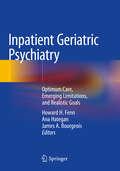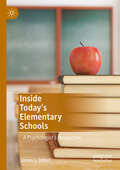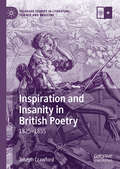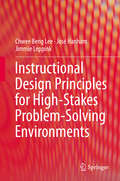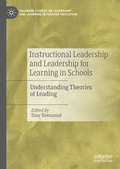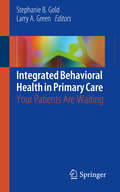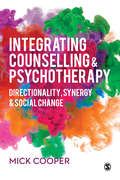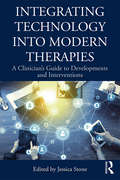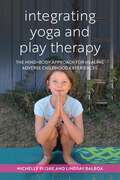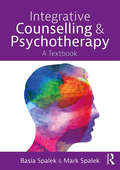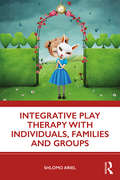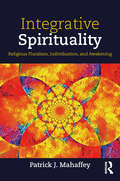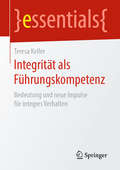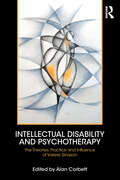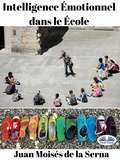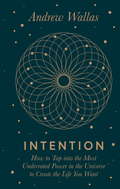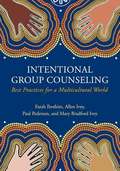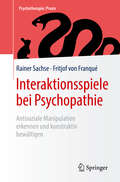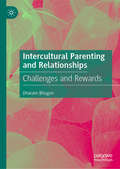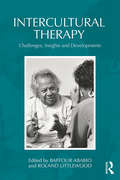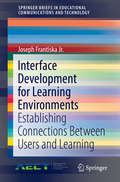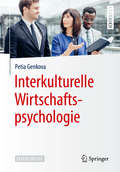- Table View
- List View
Inpatient Geriatric Psychiatry: Optimum Care, Emerging Limitations, and Realistic Goals
by James A. Bourgeois Ana Hategan Howard H. FennThis book offers mental health guidelines for all medical professionals facing the emerging challenges presented by an aging population worldwide. The text acknowledges that as the geriatric demographic grows, limited resources and infrastructures demand quality protocols to deliver inpatient geriatric psychiatric care, and that many physicians may not be trained to address these specific needs. This text fills this gap with guidelines assessing, diagnosing, and treating aging patients as they present in the emergency room and other settings. Unlike any other text, this book focuses on how to optimize the use of the inpatient setting by recommending evaluations and treatments, and offering flow-charts and figures of key points, to guide both general workup and continued evaluation and treatment. This approach aims to minimize instances of premature release or readmissions and to improve outcomes. Chapters cover the various issues that clinicians face when working with an older patient, including legal topics, limitations to treatment, prescription-related complications, patients struggling with substance abuse, and various behavioral concerns. Written by experts in the field, the text takes a multidisciplinary approach to deliver high-quality care as needs of the aging population evolve. Inpatient Geriatric Psychiatry is a vital resource for all clinicians working with an aging population, including geriatricians, psychiatrists, neurologists, primary care providers, hospitalists, psychologists, neuropsychologists, emergency room and geriatric nurses, social workers, and trainees.
Inside Today’s Elementary Schools: A Psychologist’s Perspective
by James J. DillonThis book takes readers on a tour of a day in the life of a public elementary school in an effort to give parents and other stakeholders a sense of the realities of the classroom. The tour reveals ten worrisome things about today’s schools and considers what to do about them. Dillon emphasizes the need for future schools to be places filled with adventure and high purpose, with classrooms small enough to waste only a minimum of time. They should be free from stifling levels of bureaucracy, supervised by rotating teacher administrators rather than career managers. The book asserts that schools should be staffed by scholarly and engaged teaching professionals dedicated to helping students live a healthy adult life in a democracy rather than imposing a one-size-fits-all, furiously assessed college prep curriculum on everyone. In all, Dillon argues, schools should be places with classrooms of narrow ability ranges dedicated to teaching a coherent curriculum, all in a context of full buy-in and support from students’ families. Let’s go inside today’s elementary schools.
Inspiration and Insanity in British Poetry: 1825–1855 (Palgrave Studies in Literature, Science and Medicine)
by Joseph CrawfordThis book explores the ways in which poetic inspiration came to be associated with madness in early nineteenth-century Britain. By examining the works of poets such as Barrett, Browning, Clare, Tennyson, Townshend, and the Spasmodics in relation to the burgeoning asylum system and shifting medical discourses of the period, it investigates the ways in which Britain’s post-Romantic poets understood their own poetic vocations within a cultural context that insistently linked poetic talent with illness and insanity. Joseph Crawford examines the popularity of mesmerism among the writers of the era, as an alternative system of medicine that provided a more sympathetic account of the nature of poetic genius, and investigates the persistent tension, found throughout the literary and medical writings of the period, between the Romantic ideal of the poet as a transcendent visionary genius and the ‘medico-psychological’ conception of poets as mere case studies in abnormal neurological development.
Instructional Design Principles for High-Stakes Problem-Solving Environments
by Chwee Beng Lee José Hanham Jimmie LeppinkThis book examines the types of problems and constraints faced by specialists in the areas of security, medicine, mental health, aviation and engineering. Every day we rely on highly trained specialists to solve complex problems in high-stakes environments, that is, environments involving direct threats to the preservation of human life. While previous work has tended to focus on problem solving in a single domain, this book covers multiple, related domains. It is divided into three parts, the first of which addresses the theoretical foundations, with coverage of theories of instructional design and expertise. Part two covers the five high-stakes domains and offers directions for training in these domains. In turn, part three provides practical guidelines for instructional design in high-stakes professions, including learner analysis, task analysis, assessment and evaluation. The book is intended for a broad readership, including those who operate in high-stress, time-pressure occupations. Trainers at professional organisations can utilise the theoretical frameworks and training strategies discussed in this book when preparing their clients for complex, real-world problem solving. Further, the book offers a valuable resource for academics and graduate students, as well as anyone with an interest in problem solving.
Instructional Leadership and Leadership for Learning in Schools: Understanding Theories of Leading (Palgrave Studies on Leadership and Learning in Teacher Education)
by Tony TownsendThis book offers a nuanced understanding of how two different theories of leadership can be applied to achieve better results within schools. These leadership theories – Instructional Leadership and Leadership for Learning – have assisted our recent understanding of school leadership. This book interrogates the theories themselves as well as their impact on education systems around the world. It also looks at how they can be practically applied to educate school leaders within their schools and beyond, building partnerships with families, schools and other community agencies serving students. In doing so, the book considers the possibility that these theories are not opposed, but two sides of the same coin. Both are underpinned by the question ‘how do we provide the best educational experience for students?’. The answer to this question will determine the way leaders go about the task of leading schools. This important book will be of interest and value to students and scholars of educational leadership, as well as educational leaders themselves.
Integrated Behavioral Health in Primary Care: Your Patients Are Waiting
by Stephanie B. Gold Larry A. GreenThis book provides an evidence-based guide for primary care physicians seeking to integrate behavioral health into their practice. This is grounded in the underlying notion that integrating behavioral health and primary care is not an adjustment to practice but a reconstruction of how primary health care is defined and delivered. While some aspects (billing and financing) will be specific to the policy context in the United States, much of the book will contain universal lessons for an approach to integration from a primary care perspective that may be relevant across the globe. This guide is organized to follow a comprehensive approach, derived from lessons learned by early adopters of integration. Dividing the book in this manner creates a unique and natural flow from the “why” of integrating care to a step-by-step approach to achieve integration in a practice. The book includes the case for why integrating behavioral health is important; what integration looks like in practice; and how to transform a practice and grow a team of clinicians to work together to address mental, emotional, and behavioral problems. Each chapter starts with a short preamble to introduce the stage of integration. Each chapter and subchapter would end with a summary box of key messages and a short list of resources (articles, websites, etc) for further information for each topic. Where relevant, chapters additionally include a brief section on application for specific populations (pediatrics, geriatrics, etc). This is an ideal guide for primary care physicians and their medical and administrative teams interested in integrating behavioral health in their practice.
Integrating Counselling & Psychotherapy: Directionality, Synergy and Social Change
by Professor Mick CooperHow can therapists integrate theories and practices from across the psychological therapies? This book presents a framework for understanding distress and change that can unite different orientations, along with sociopolitical perspectives. Its starting point is that therapy aims to help clients move towards the things they most deeply want. It shows how the actualisation of these ‘directions’ leads to greater well-being, and how this can be brought about through the development of internal and external synergies. Using in-depth cases, the book provides detailed guidance on how this framework can be applied. After reading this book, you’ll feel better equipped to understand, and work with, your clients’ directions—tailoring the therapy to their unique wants.
Integrating Counselling & Psychotherapy: Directionality, Synergy and Social Change
by Professor Mick CooperHow can therapists integrate theories and practices from across the psychological therapies? This book presents a framework for understanding distress and change that can unite different orientations, along with sociopolitical perspectives. Its starting point is that therapy aims to help clients move towards the things they most deeply want. It shows how the actualisation of these ‘directions’ leads to greater well-being, and how this can be brought about through the development of internal and external synergies. Using in-depth cases, the book provides detailed guidance on how this framework can be applied. After reading this book, you’ll feel better equipped to understand, and work with, your clients’ directions—tailoring the therapy to their unique wants.
Integrating Technology into Modern Therapies: A Clinician’s Guide to Developments and Interventions
by Jessica StoneIntegrating Technology into Modern Therapies provides clinicians with an innovative, research-based foundation for incorporating technology into clinical practice. It offers an overview of current technological developments in therapy, such as the use of therapeutic texting, virtual reality programs, tablet apps, and online games. Chapters examine therapeutic applications of technology for those who have experienced trauma and a variety of conditions including autism spectrum disorder, ADHD, and speech concerns. The book also offers suggestions for how technology can be used in hospitals, as well as with migrant, refugee, and homeless populations. Combining theory and research with a wealth of case studies and practical resources, this book will be relevant to all mental health, speech and language, and child life specialists.
Integrating Yoga and Play Therapy: The Mind-Body Approach for Healing Adverse Childhood Experiences
by Michelle Pliske Lindsey BalboaThis book presents the foundational knowledge to ethically and knowledgably integrate yoga into play therapy practice with children and families and create life-long change.The mind-body connection that underpins the approach taken by the authors helps children to integrate adverse experiences and find new meanings associated with the past, and allows healing to begin. The book covers infant toddler mental health, theories of attachment, learning and development, neurobiology and the pervasive effects of developmental adversity or trauma on a child. It offers adaptations with special populations including group work and family systems work, and provides next steps for future professional growth in this area.
Integrative Counselling and Psychotherapy: A Textbook
by Basia Spalek Mark SpalekIntegrative Counselling and Psychotherapy: A Textbook is an engaging and comprehensive guide to integrative counselling, providing an explanation of the theoretical ideas underpinning person-centred, interpersonal, cognitive-behavioural (CBT) and hypnotherapeutic modalities. Divided in two major sections, this book first provides a detailed exploration of the key integrative concepts - presence, emotional and psychological processing, attachment, thinking, and the unconscious – and then practically applies these concepts to the issues commonly brought by clients to therapy. With the help of case studies, exercises and chapter questions, Integrative Counselling and Psychotherapy will be essential reading for students on integrative counselling and psychotherapy courses and for integrative practitioners.
Integrative Play Therapy with Individuals, Families and Groups
by Shlomo ArielIntegrative Play Therapy with Individuals, Families and Groups is a complete theory-to-practice introduction to a comprehensive integrative model of play therapy, developed by Shlomo Ariel. It synthesizes numerous concepts, methods and techniques found in the various branches of play theory and research under a unified conceptual and linguistic roof of information-processing, cybernetics and semiotics. The author's tenet is that any case, whatever the presenting difficulties, can be treated by such an integrative, multi-systemic approach. This book abounds with vivid observations and case descriptions, followed by discussions in a fictional inter-disciplinary seminar. Every chapter is followed by a brief summary, homework assignments and a classified list of relevant publications. Integrative Play Therapy with Individuals, Families and Groups will generate immense interest throughout the play therapy community. It can serve as a textbook for budding play therapists and as a reference book for more experienced practitioners.
Integrative Spirituality: Religious Pluralism, Individuation, and Awakening
by Patrick J. MahaffeyIn Integrative Spirituality, Patrick J. Mahaffey elucidates spirituality as a developmental process that is enhanced by integrating the teachings and practices of multiple religious traditions, Jungian depth psychology, and contemplative yoga. In the postmodern world of religious pluralism, Mahaffey compellingly argues that each of us must fashion a unique path to wholeness which integrates aspects of life and of the self that have become disconnected and disowned. Integrative Spirituality uniquely conjoins four components: exemplary religious pluralists from three traditions, individuation, the forms of contemplative Hindu yoga that have been successfully transmitted to the West, and a presentation of two models for integrating psychological growth and spiritual awakening. The book presents pioneering practitioners in each field who exemplify how we may fashion our own approach to integrating both spiritual awakening and psychological development and delineates an array of spiritual practices that integrate the somatic, psychological, interpersonal, and spiritual aspects of life. Ultimately, Mahaffey contends that integrative spirituality is a mode of being that fully embraces the divinity inherent in each of us and in the world. Integrative Spirituality will be essential reading for academics and students of Jungian and post-Jungian studies, transpersonal and Jungian psychology, and religious studies and contemplative education. It will also be of interest to analytical and depth psychologists in practice and in training, and to anyone seeking a greater understanding of spirituality, psychological growth, religious traditions, individuation, and contemplative yoga.
Integrität als Führungskompetenz: Bedeutung und neue Impulse für integres Verhalten (essentials)
by Teresa KellerIn diesem essential zeigt Teresa Keller, wie integres Verhalten entwickelt und dauerhaft aufrechterhalten werden kann. Die Autorin verdeutlicht die Bedeutung sowie Wirkung von Integrität und erläutert Faktoren wie Achtsamkeit, Haltung, Anstand und emotionale Intelligenz, die maßgeblich an Integrität beteiligt sind. Vor allem aber macht sie die Relevanz von Integrität als Führungskompetenz klar – zu oft wird Integrität als nachrangiges Führungs- und Unternehmensziel behandelt.
Intellectual Disability and Psychotherapy: The Theories, Practice and Influence of Valerie Sinason
by Alan CorbettIntellectual Disability and Psychotherapy: The Theories, Practice and Influence of Valerie Sinason charts the transformative impact of the noted psychotherapist’s work with children and adults with intellectual disabilities upon both a generation of clinicians and the treatment and services delivered by them. Examining how contemporary Disability Therapists have discovered, used and adapted such pioneering concepts as the Handicapped Smile and Secondary Handicap as a Defence Against Trauma in their clinical work, the book includes contributions from renowned practitioners and clinicians from around the world. It shines a light on how Sinason’s work opened doors for working with people who were previously thought of as unreachable. Intellectual Disability and Psychotherapy will be an essential resource to anyone working with children or adults with disabilities, as well as psychotherapists interested in exploring Valerie Sinason’s work.
Intelligence Émotionnel dans le École
by Juan Moisés de la SernaParler de l'Intelligence émotionnelle est de le faire maintenant, en termes de développement de la personne, un aspect qui a été en plein essor depuis des dizaines d'années et dont la portée a été utile non seulement dans le champ si vous n'avez pas également. De plus en plus, il y a plus d'études qui s'accumulent sur les avantages d'un bon développement de l'Intelligence Émotionnelle, recommandé pour être formé en elle-le plus tôt sera le mieux. Par conséquent, l'école est le droit de l'environnement pour les petits et même les adolescents à connaître et à développer l'Intelligence Émotionnelle.
Intention: How to tap into the most underrated power in the universe
by Andrew Wallas Business Alchemy LimitedIntention is the seed of all change and it is the creative power that fulfils our dreams. An intention contains the DNA of manifestation and it is therefore the key to creating the life you want. Our outer world is a reflection of our inner world, and so the only way to shift reality is to start with what is inside us.According to research, 92% of new year resolutions fail by the end of the year. The only way to reverse this trend is to go deeper.This powerful book guides you through a process of practical self-enquiry that gets to the true heart of your intentions for this life. You will weed out the obstacles in the way of your wishes, such as limiting self-beliefs and the stories you currently tell about yourself. You will plant the seeds of intention with a sense of true clarity and infinite possibility, and then water them with your daily actions and care. And then all that needs to be done is to trust in the outcome and allow your intentions to grow.Intention is for anyone who wishes to align their life with their innermost wishes and tap into the most underrated power in the universe.PRAISE FOR Intention:"It is a joy to find a life-changing book that is so clearly and beautifully written. Andrew Wallas distils decades of clinical practice with wisdom and a deceptively light touch. The overall message is strong. We are each responsible for our own path to happiness, and Intention is the inspiring guidebook that can help us to find it." - Georgia Coleridge, author of The Chakra Project PRAISE FOR ANDREW WALLAS:"Intention is a superpower which when used correctly aligns us to our purpose and helps fulfil our heart's work. Andrew Wallas elegantly and generously shows us how. His approach is simple, yet it is not easy - but boy is it worth it." Emma Cannon, fertility and women's health expert, acupuncturist and author of Fertile "Andrew holds the space for you to reconnect with your inner wisdom. His skill is that he is intuitive but practical." - Financial Times, How To Spend It"Fast-tracked healing" - Vogue "Andrew Wallas has a gift for transforming stuck energy and releasing you from negative patterns" - Tatler"With easy charm and 30 years' experience as a psychotherapist, Andrew Wallas helps clients remove the obstacles standing in their way"- Vanity Fair "He has an uncanny ability to sense emotional blocks and asks penetrating questions that unearth destructive patterns of behaviour" - The Daily Mail"Amazingly honest. Incredibly insightful. For any blocks you need to uncover to be able to create the life you want - visit the Wizard" - Tanya, business woman"I have met many "spiritual" healers, guides and psychics over the years. However, none of them have managed to explain to me in terms that I understand how I can effectively blend the real or human world with this spiritual calling that I feel. I believe that I have found in you my guru / teacher that can really help me navigate this exciting journey" - Gavin, businessman
Intention: How to tap into the most underrated power in the universe
by Andrew WallasIntention is the seed of all change and it is the creative power that fulfils our dreams. An intention contains the DNA of manifestation and it is therefore the key to creating the life you want. Our outer world is a reflection of our inner world, and so the only way to shift reality is to start with what is inside us.According to research, 92% of new year resolutions fail by the end of the year. The only way to reverse this trend is to go deeper.This powerful book guides you through a process of practical self-enquiry that gets to the true heart of your intentions for this life. You will weed out the obstacles in the way of your wishes, such as limiting self-beliefs and the stories you currently tell about yourself. You will plant the seeds of intention with a sense of true clarity and infinite possibility, and then water them with your daily actions and care. And then all that needs to be done is to trust in the outcome and allow your intentions to grow.Intention is for anyone who wishes to align their life with their innermost wishes and tap into the most underrated power in the universe.
Intention: How to tap into the most underrated power in the universe
by Andrew Wallas Business Alchemy LimitedIntention is the seed of all change and it is the creative power that fulfils our dreams. An intention contains the DNA of manifestation and it is therefore the key to creating the life you want. Our outer world is a reflection of our inner world, and so the only way to shift reality is to start with what is inside us.According to research, 92% of new year resolutions fail by the end of the year. The only way to reverse this trend is to go deeper.This powerful book guides you through a process of practical self-enquiry that gets to the true heart of your intentions for this life. You will weed out the obstacles in the way of your wishes, such as limiting self-beliefs and the stories you currently tell about yourself. You will plant the seeds of intention with a sense of true clarity and infinite possibility, and then water them with your daily actions and care. And then all that needs to be done is to trust in the outcome and allow your intentions to grow.Intention is for anyone who wishes to align their life with their innermost wishes and tap into the most underrated power in the universe.PRAISE FOR Intention:"It is a joy to find a life-changing book that is so clearly and beautifully written. Andrew Wallas distils decades of clinical practice with wisdom and a deceptively light touch. The overall message is strong. We are each responsible for our own path to happiness, and Intention is the inspiring guidebook that can help us to find it." - Georgia Coleridge, author of The Chakra Project PRAISE FOR ANDREW WALLAS:"Intention is a superpower which when used correctly aligns us to our purpose and helps fulfil our heart's work. Andrew Wallas elegantly and generously shows us how. His approach is simple, yet it is not easy - but boy is it worth it." Emma Cannon, fertility and women's health expert, acupuncturist and author of Fertile "Andrew holds the space for you to reconnect with your inner wisdom. His skill is that he is intuitive but practical." - Financial Times, How To Spend It"Fast-tracked healing" - Vogue "Andrew Wallas has a gift for transforming stuck energy and releasing you from negative patterns" - Tatler"With easy charm and 30 years' experience as a psychotherapist, Andrew Wallas helps clients remove the obstacles standing in their way"- Vanity Fair "He has an uncanny ability to sense emotional blocks and asks penetrating questions that unearth destructive patterns of behaviour" - The Daily Mail"Amazingly honest. Incredibly insightful. For any blocks you need to uncover to be able to create the life you want - visit the Wizard" - Tanya, business woman"I have met many "spiritual" healers, guides and psychics over the years. However, none of them have managed to explain to me in terms that I understand how I can effectively blend the real or human world with this spiritual calling that I feel. I believe that I have found in you my guru / teacher that can really help me navigate this exciting journey" - Gavin, businessman
Intentional Group Counseling: Best Practices for a Multicultural World
by Paul Pedersen Mary Bradford Ivey Allen Ivey Farah IbrahimThe text presents students with the latest research in applied psychology and group counseling, and also breaks down the complex art of leadership into individual skills using the Microskills approach. Embracing an experiential learning framework, students are guided through the practical application of learned Microskills in real-world group settings to further develop their competencies within dynamic environments.
Interaktionsspiele bei Psychopathie: Antisoziale Manipulation erkennen und konstruktiv bewältigen (Psychotherapie: Praxis)
by Rainer Sachse Fritjof von FranquéIm vorliegenden Buch wird beschrieben, wie manipulatives Handeln von Personen mit Psychopathie erkannt und bewältigt werden kann. Die psychopathische Persönlichkeitsstörung (engl.: Psychopathy) ist definiert durch eine Kombination aus interaktionellen, affektiven, antisozialen und sich im Lebensstil ausdrückenden Besonderheiten, zu denen Egozentrizität, manipulierendes Verhalten, ein Mangel an Mitgefühl, Schuld und Reue, pathologisches Lügen, Verantwortungslosigkeit sowie die kontinuierliche Verletzung sozialer Normen und Erwartungen zählen. Fachleute haben vor allem Schwierigkeiten, mit den interpersonellen Merkmalen dieser Störung umzugehen. Dieses Buch bietet hierfür konkrete Unterstützung. Geschrieben für … Psychotherapeuten, Coaches, Diagnostiker, Psychiater, forensische Psychologen und alle, die beruflich mit Psychopathen zu tun haben. Die Autoren: Prof. Dr. Rainer Sachse ist Psychologischer Psychotherapeut, Begründer der „Klärungsorientierten Psychotherapie“ und Leiter des Instituts für Psychologische Psychotherapie (IPP) in Bochum. Fritjof von Franqué ist sexualforensischer Psychotherapeut und leitender Psychologe am Institut für Sexualforschung und Forensische Psychiatrie des Universitätsklinikums Hamburg-Eppendorf (UKE).
Intercultural Parenting and Relationships: Challenges and Rewards
by Dharam BhugunThis book provides understandings of how intercultural, -racial, -ethnic, -national, and -faith couples and parents in Australia bring up their children and manage their relationships. Which challenges and benefits do they encounter, and which strategies do they use to negotiate their differences and belongingness? In portraying the lived experiences of intercultural couples and parents, Bhugun considers contextual and external factors such as individual and personality traits, the environment, gender and power, religion, socio-economic status, extended family, friends, and diasporic communities. Moving the reader from beyond negative stereotypes to a more nuanced representation of both the challenges and benefits of the phenomenon, Intercultural Parenting and Relationships provides intimate testimonies and offers innovations in theory and practice.Scholars, practitioners, students, intercultural couples, parents, families and the wider community will benefit from the rich insights into the challenges and successes of intercultural relationships and parenting presented in this book.
Intercultural Therapy: Challenges, Insights and Developments
by Roland Littlewood Baffour AbabioIntercultural Therapy: Challenges, Insights and Developments examines the impact of the work of the Nafsiyat Intercultural Therapy Centre in North London, which focused on providing free, psychodynamic therapy. Set up by Jafar Kareem, the centre was the first psychotherapy service with the specific task of offering psychodynamic psychotherapy to Britain’s Black and ethnic minority population. The editors of this book have invited a number of Nafsiyat therapists and colleagues to give their view on what has changed, or not changed, in regard to the integration of intercultural issues into mainstream therapy. Intercultural Therapy will be of interest to all psychotherapists working in multicultural practices, as well as practitioners and social workers.
Interface Development for Learning Environments: Establishing Connections Between Users and Learning (SpringerBriefs in Educational Communications and Technology)
by Joseph Frantiska Jr.This brief will examine and explore some tools and techniques that can be used to develop interfaces for learning environments. Interface design has been a topic in software engineering for many years. The advent of graphical user interfaces has created many remedies and challenges for the software engineer. In recent years with an increased emphasis in educational technology, instructional designers are also included in this arena. The interface can be a driver in terms of a learning environment’s ability to engage a student. It can also provide a point of information exchange and therefore learning between the student and the environment’s software. Thus, the issue of an interface is vital to the success of a learning environment. This brief will produce a variety of interfaces for various environments to allow the designer to contrast and compare them based upon the required purpose. The designer will have a toolkit filled with tools and techniques which will allow for interfaces that will engage the student and facilitate their learning. The primary audiences are K-12 and post-secondary educators who desire to create digital media based educational materials.
Interkulturelle Wirtschaftspsychologie (Springer-Lehrbuch)
by Petia GenkovaDieses Lehrbuch befasst sich mit den kulturellen Unterschieden in der Wirtschaftspsychologie. Im Mittelpunkt steht die Wechselwirkung zwischen Kultur und ihrem Einfluss auf Denken und Verhalten im wirtschaftlichen Kontext. Mit Lernzielen, Praxistipps, Definitionen, Verständnisfragen und Zusammenfassungen ist dieses Werk didaktisch klar strukturiert und leicht verständlich aufgebaut. Eindrücklich zeigt es auf, welche Phänomene eher universell, d.h. in allen Kulturen gültig sind, und welche der affektiven, kognitiven und verhaltensbezogenen Phänomene eher kulturspezifischen Regeln und Normen unterliegen. Zum besseren Verständnis sind die Zusammenhänge praxisnah mit Fallbeispielen veranschaulicht. Aktuelle Studien runden die wissenschaftlichen Grundlagen mit interessanten Erkenntnissen und Beispielen ab. Direkte Handlungsimplikationen regen zum Nachdenken an und laden zur praktischen Umsetzung ein.
